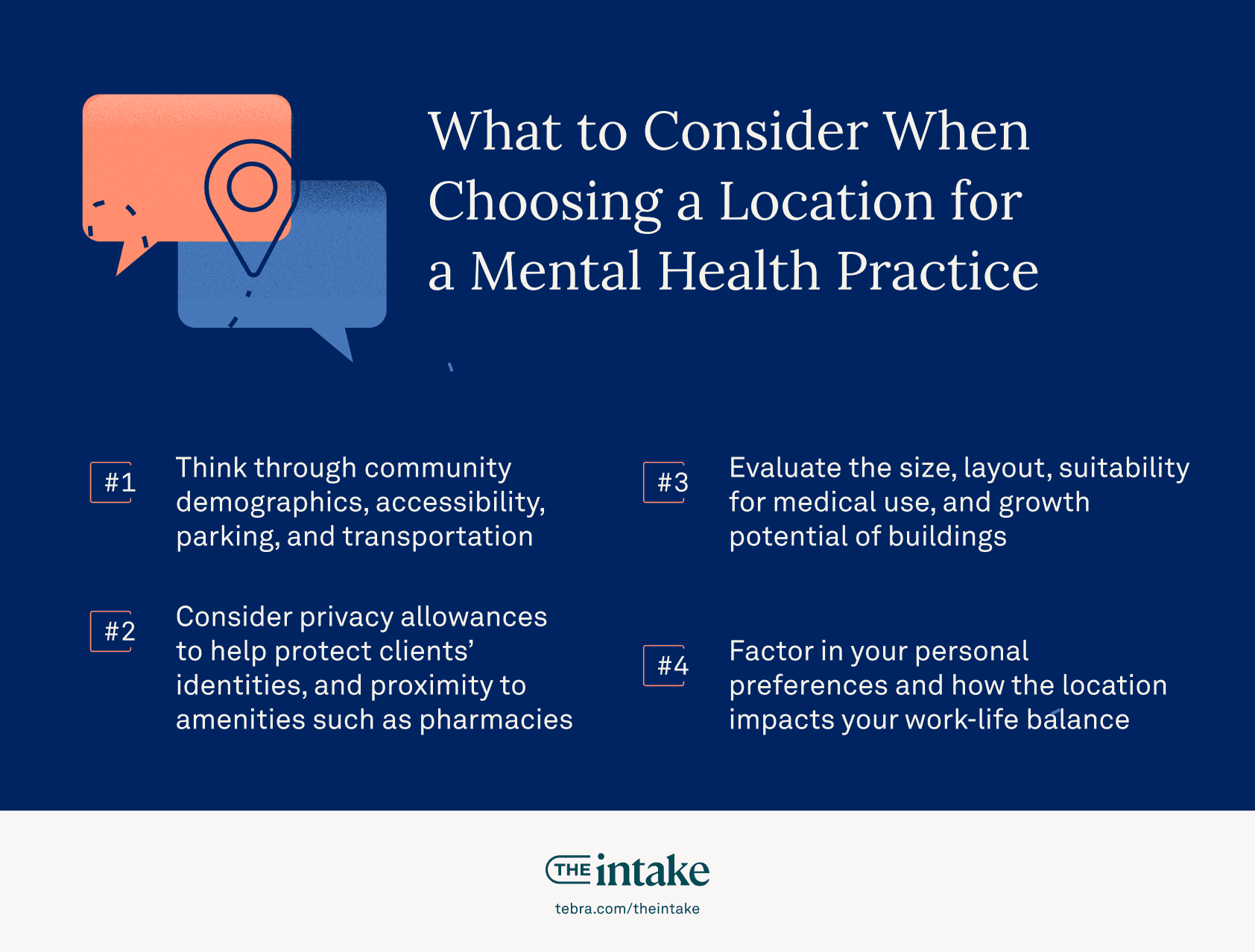Overview
- Starting a mental health practice requires licensing and business planning.
- Credentialing with insurers ensures reimbursement for services.
- Marketing strategies help attract and retain patients.
With the increasing demand for high-quality mental healthcare and the global mental health services industry projected to reach a staggering $532.86 billion by 2030, the prospects are bright for aspiring independent practice owners in this specialty.
While starting a mental health private practice can be personally and professionally rewarding, it can come with a learning curve — especially if you’re not familiar with the fundamental steps. Taking the time to understand the business aspects involved and to do things well is definitely worthwhile.
This guide covers the key considerations and tips you’ll need to know to establish your mental health private practice and set yourself and clients up for success.
Understand the importance of a private practice
So, why open a private practice? Besides the potential purely financial benefits, there are many other advantages to going out on your own.
Compared to the bureaucratic, protocol-driven corporate health system, a mental health private practice offers autonomy and control. This means you can:
- Decide on the scope of your practice
- Have complete control over administrative and clinical matters
- Determine the therapeutic approaches you use
- Create your ideal work culture
- Choose the types of services you want to offer
- Control the types of clients you see
- Incorporate advanced equipment and technologies
- Design workflows that prioritize patient satisfaction and optimize efficiency
- Set your own fees
- Determine work schedules and patient volume
- Control time at work and time off
- Build out a brand that represents you and your values
You also get to offer continuity of personalized care and foster great trust and efficacy. This establishes and builds strong, long-lasting therapeutic relationships with your patients.
And as your practice grows, you can network with new contacts and establish collaborations with like-minded mental health providers.
Evaluate your readiness and plan
You’ve probably asked yourself the following questions at least once:
- How do I start a small private practice?
- Do I have what it takes to succeed?
- Is private practice worth it?
“Personal readiness is key when starting a mental health private practice. So, it’s essential to evaluate yours.”
Personal readiness is key when starting a mental health private practice. So, it’s essential to evaluate yours.
- Start by considering the hard work, time, and financial investment it takes to start and run a mental health private practice. Seek tips and advice from other therapists who have experience starting their own practices.
- Then, analyze your skills, knowledge, experience, industry expertise, and financial stability. Define your personal and professional goals as a therapist and practice owner. Use these goals to plan where you’re heading and the steps to help you get there.
- Decide ahead of time how much monthly income you'll need to generate. Then calculate how many clients you'll need to see weekly to ensure financial stability. To prevent burnout and compassion fatigue, limit your hours of availability to those which best fit your personal schedule. Create a plan for investing in your own well-being so you can consistently provide quality care to your patients.

Necessary qualifications and licenses
Mental health service professionals typically pursue private practice after obtaining years of clinical experience. Before taking the leap, verify you meet the professional qualifications and licensure requirements for your state. That will ensure you can:
- Legally practice as an independent mental health practitioner
- Specialize in various types of counseling and clients
- Improve your eligibility to practice in interstate Counseling Compact states
Each state has a regulatory body (board of counseling) and requirements for licensed mental health professionals. You’ll need at least a graduate degree (master’s or doctorate) from an accredited program recognized by your profession, as well as post-graduate supervised experience. You’ll also need to pass the National Counselor Examination or the National Clinical Mental Health Counseling Examination.
Depending on your state, you may need a valid therapy or counseling license to operate a mental health private practice.
Formulate a solid business plan
A solid private practice business plan will help you visualize your path, support your business growth, and make decisions aligned with your goals. It should include the following:
- Executive summary: Your practice’s vision, mission, key objectives, unique value proposition, and competitive advantage.
- Practice description: Outline your practice area, niche, therapy treatments and approaches, specific mental health services, and target patient population.
- Market research and analysis: Investigate your local mental healthcare market, including demographics, patient trends, and competition.
- Organizational structure: Overview of your management team along with key personnel’s qualifications and expertise.
- Services and operations: Describe your mental health services, emphasizing your unique offerings and/or specialization. Outline processes such as patient care, appointment scheduling, and workflow management. Also address patient privacy measures, quality control, and regulatory compliance.
- Marketing and branding strategy: Outline the specific channels, including referrals and digital marketing, you’ll use to attract and retain clients. Include your pricing strategy, patient retention plan, and insurance policy.
- Budget and financial planning: Create financial projections, such as balance sheets, cash flow projections, and income statements, to offer insight into revenue growth and profitability. Estimate start-up costs, expected patient volumes, revenue projections, insurance contracts, and operational expenses. Conduct a break-even analysis.
- Risk analysis: Highlight potential challenges and risks, such as competition, regulatory compliance, financial risks, or unexpected events. Develop strategies or contingency plans to mitigate them for business continuity.
- Action plan: Outline the steps, timeline, and assigned responsibilities for launching your private practice. Include aspects such as staffing needs, facility setup, license or permit requirements, business banking options, and technology implementation.
- Exit plan: An exit plan can help you prepare for emergencies including your own injury or death; a geographical relocation; or a shift in your career interests. Ask yourself how you’ll transition your patients, what you’ll do with equipment and supplies, and what you feel will be the best way to step away. Taking time to consider these matters now will make the process more manageable later.
- Appendix: Include supporting documents, like key personnel resumes, licenses, insurance policies, leases, market research, and prospective client data.
Determine a legal business structure
Then, set up a legal therapy business structure to establish and manage your practice effectively. The right business entity could help protect you from legal and financial liability, save you money on taxes, and lay the groundwork for future expansion.
Depending on your situation and needs, you can set up your practice as a sole proprietorship, limited liability company (LLC), partnership, C corporation, or S corporation. Some states, like Colorado, Idaho, and Illinois, offer the Professional Limited Liability Company (PLLC) structure for therapists. A PLLC operates like an LLC, but has some extra malpractice insurance provisions.
Each option has its benefits and drawbacks, so talk to an accountant or attorney to help you choose the right one.
Establish your practice setup
Next, you’ll need to name and register your mental health practice. Choose a practice name that reflects your practice, connects with clients, and lends itself to effective branding and marketing.
Before registering a practice name, check with your state business registry to ensure it’s available, not trademarked in your state, and adheres to the law. Some states have specific criteria for naming professional corporations. Pay special attention to naming nuances, as it’s easy to miss such guidelines when filing your application.
Depending on the legal structure you choose, you may use your social security number or an Employer Identification Number (EIN) from the Internal Revenue Service (IRS). If you choose to accept insurance, get a National Provider Identifier (NPI) so your clients can submit insurance claims for their sessions. Once you’ve secured all these documents, complete and submit applications to the insurance companies with whom you’ve decided to work and allow 3–6 months for their responses.
Then, determine whether you’ll see clients in person or online.
If you’re starting a fully virtual mental health practice (telehealth), you may not need to rent an office outside your home, but you will need to set up a professional website. Prioritize client privacy, especially if you’ll conduct sessions in shared spaces that could be compromised.
Alternatively, set up a physical practice. Depending on whether you’re going full-time or part-time, you can let or sublet office space in your area, keeping in mind factors like local competition, standalone clinic versus multi-use space, and parking availability.

You’ll also need to acquire the necessary business permits and licenses to operate your private practice. Depending on your location, you may need city- or county-specific permits and licenses. Check your local government office or website to learn about the required documentation, processes, and potential fees involved.
Marketing and growing your practice
Even if you have a full client list (or waitlist), there’s no guarantee it will be so in the future. Marketing your practice can help prospective clients find you and minimize the effects of seasonality and other highs and lows on your business.
You don’t need a huge marketing budget to be successful. For most practices, word-of-mouth referrals work, but they’re not enough to attract new clients.
Other strategies you can use to market and grow your practice include:
- List your therapy practice in free or paid directories, such as GoodTherapy or Mental Health Match. There are also location-specific and community-specific directories, like First Session and Therapy for Latinx.
- Build a referral network by attending local events, speaking opportunities, online workshops, and conferences, or joining a national association for therapists, like the American Psychological Association (APA).
- Grow a social media following on various platforms and share your expertise to establish your brand and keep your practice top-of-mind with potential clients and referral sources.
- Start an email newsletter, which you can send out monthly or weekly to keep you top-of-mind with your target audience and clients.
- Experiment with paid ads on Google and social media platforms to create brand awareness and market your practice to potential clients.
- Launch a blog to demonstrate your expertise and educate your current and potential clients. Use search engine optimization (SEO) strategies to ensure your website ranks highly in search engine results pages (SERPs) and boost traffic.
- Start a vlog and/or podcast to share career advice, answer questions, bust myths, and more. You can also join a podcast advertising network to market your practice on podcasts and connect with listeners interested in mental health and well-being topics.
Manage your practice efficiently
Managing your private practice ensures you focus on providing quality patient care with no interruptions to your workflow.
Invest in technology and practice management software to streamline your front-office and back-office functions, enhance the patient experience, grow your client base, and potentially differentiate your practice from the competition. For example, you can offer online appointment scheduling, digitize patient intake forms, deploy chatbots for simple customer service queries, and automate back-office processes like billing and collections.
These tools can also help your practice comply with all relevant regulations, including professional and HIPAA compliance, and guarantee the safety of your business and clients.
Plan to provide continuing professional development (CPD) and training for yourself and your team to maintain, improve, and broaden your knowledge, competence, and expertise, and stay updated on the latest in mental health advancements, best practices, and regulations.
Hopefully, this guide will help you on your journey towards starting, running, and growing a successful mental health private practice.
Grab a copy of Tebra’s Independent Provider Playbook to enhance your practice’s competitiveness.
You might also be interested in
Wondering how to get patients to keep coming back? Learn what influences patient choices and behaviors in the 2024 Patient Perspectives report.






